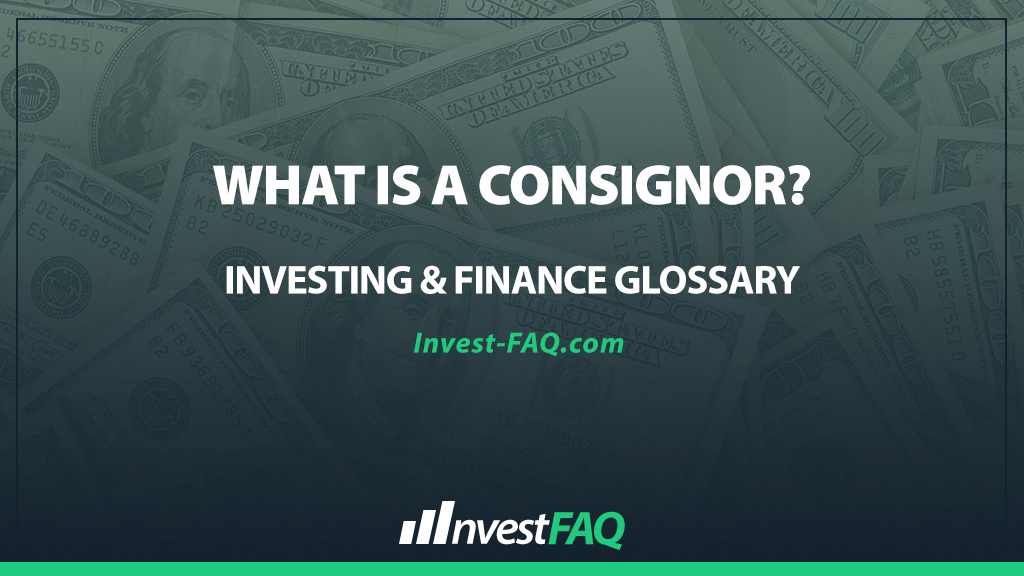
Consignor
Contents
A consignor is an individual or entity that owns goods or merchandise and entrusts them to another party, known as the consignee, for the purpose of sale. In a consignment relationship, the consignor retains ownership of the items until they are sold by the consignee.
The consignor role is crucial in consignment arrangements across various industries, from retail to art galleries.
This business model allows consignors to widen their market reach without the immediate need for their own retail space, leveraging the consignee’s established customer base and sales channels while potentially reducing storage and marketing costs.
Example of a Consignor
“Global Fashion Brands,” a designer clothing manufacturer (the consignor), sends a batch of premium jeans to “City Boutique,” a retail shop (the consignee), to be sold on consignment. The jeans are valued at $10,000.
Inventory Sent to Consignee: 100 pairs of jeans valued at $10,000.
Consignor (Global Fashion Brands): Records the consigned inventory on its balance sheet as inventory out on consignment.
Revenue Recognition: Upon sale of the jeans, City Boutique collects the sales revenue and retains a previously agreed-upon commission before remitting the remaining proceeds to Global Fashion Brands.
In this scenario, “Global Fashion Brands” maintains ownership of the jeans until they are sold, reflecting the consigned goods as an asset on its balance sheet under “inventory out on consignment.”
This accounting treatment acknowledges that although the goods are not physically present at the consignor’s location, they remain the consignor’s property and a part of their inventory asset. Once the jeans are sold, the consignor recognizes the revenue from the sales, adjusted for the consignee’s commission.
The consignee, in turn, records a commission income for facilitating the sale.
Significance for Investing & Finance
The consignor’s role and consignment transactions hold significant implications in accounting:
Inventory Management: Properly tracking consigned goods is essential for accurate inventory counts, cost management, and understanding the consignor’s total assets.
Revenue Recognition: The consignor must carefully account for sales revenue and commissions paid to consignees, adhering to the revenue recognition principle once the sale is confirmed.
Risk Assessment: Consignors bear the risk of unsold inventory and potential loss or damage while in the consignee’s possession, impacting financial risk assessments and insurance considerations.
Financial Reporting: Consignors need to ensure that financial statements accurately reflect consigned inventory and related transactions, offering transparency to investors and stakeholders regarding the company’s financial health and operations.
In summary, a consignor plays a critical role in consignment arrangements, providing goods for sale through a consignee without transferring ownership until the point of sale.
This business model necessitates meticulous accounting practices to manage inventory, recognize revenue, and report financials accurately, ensuring clarity in the consignor’s financial position and operational results.
FAQ
Who is a consignor in a consignment agreement?
A consignor is the individual or entity that owns goods and sends them to a consignee for the purpose of sale, retaining ownership until the goods are sold.
What are the primary responsibilities of a consignor in a consignment relationship?
The consignor’s primary responsibilities include providing the goods to the consignee, setting terms for the sale, and ensuring the goods are in sellable condition, while also bearing the risk until the goods are sold.
How does a consignor recognize revenue from consigned goods?
A consignor recognizes revenue from consigned goods only when the goods are sold by the consignee to the end customer, at which point the sale is recorded and the agreed upon portion of the proceeds is received from the consignee.
Can a consignor reclaim unsold goods from a consignee?
Yes, a consignor can reclaim unsold goods from a consignee based on the terms of the consignment agreement, which may stipulate the conditions under which goods can be returned if they are not sold within a specified period.
